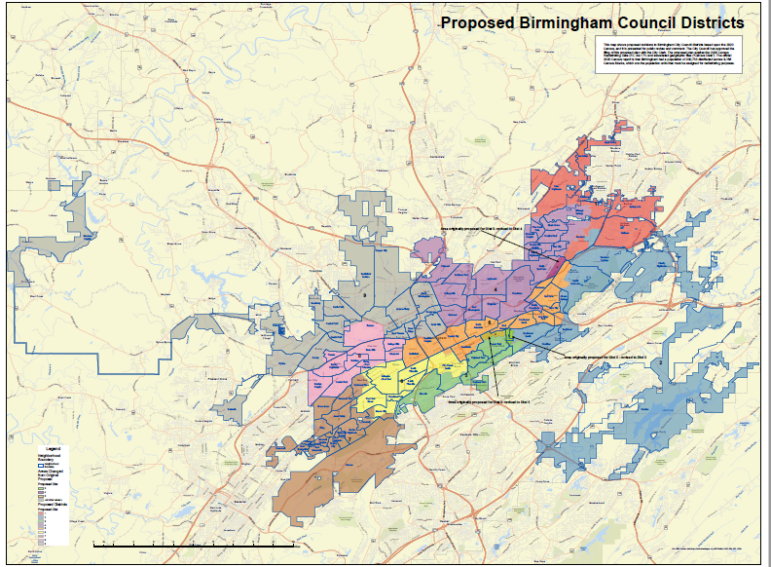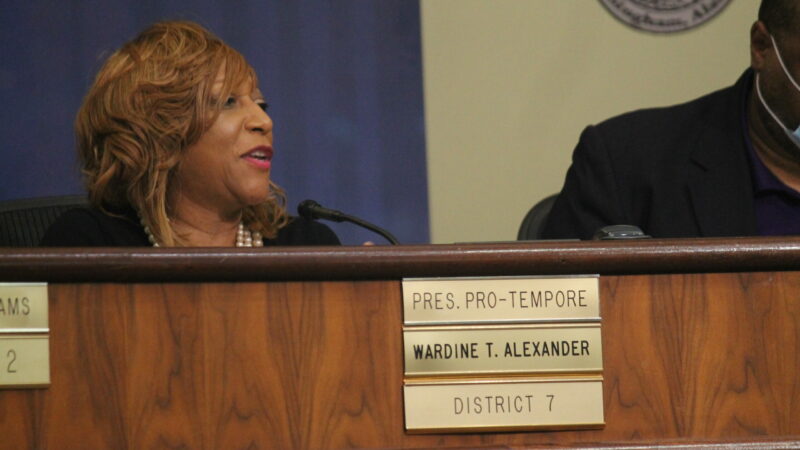Birmingham Council OKs New Districts Despite Dissent
The Birmingham City Council approved the redrawing of its district boundaries Tuesday to comport with data from the 2020 census, despite some councilors’ misgivings that the move will disenfranchise some voters.
Municipal law requires the redrawing of district lines after each federal census, which happens every 10 years. The goal of the redistricting is to balance the city’s population roughly equally among the nine districts, which each elect representatives to the City Council and school board.
Had the pandemic not occurred, redistricting would have taken place before August’s municipal elections. But delays caused by the pandemic meant that the redistricting process has taken place roughly eight months into the council’s four-year term, which left some councilors concerned that some redistricted citizens, now represented by councilors and school board members they didn’t have the chance to vote on, would see their votes as “nullified.”

“If this redistricting proposal is (passed) today, it would take effect immediately, and that is where I have an issue,” said District 5 Councilor Darrell O’Quinn. “This will impact tens of thousands of people, roughly 20,000 to 30,000. Out of those, I imagine that there were 3,000 to 5,000 people that participated in the municipal elections that happened last year. If this were to take effect immediately, it would basically be invalidating those people’s participation. It will be as if they had never participated in the election, and I cannot do that.”
O’Quinn added that he had no problem with the district changes as proposed, but he called for the ordinance to be amended to go into effect six months before the next regularly scheduled municipal election in 2025.
Kareen Crayton, whose firm Crimcard Consulting Services oversaw the redistricting process, argued that to delay implementation could leave the city open to potential litigation.
“The challenge is that the law requires for the districts to be equally populated,” he said. “So, if you don’t adopt a map that allows for compliance with that standard, you’re subject to a lawsuit” claiming that the council is “intentionally not giving people access to an equally populated district.”
O’Quinn had previously suggested asking the state Attorney General’s Office for an official opinion on the matter. State Sen. Rodger Smitherman — the father of council President Pro Tempore Crystal Smitherman — attended Tuesday’s meeting to advise against that.
“Be careful when you allow your process to go outside of your domain … . Once you hand it over, it can go to the extent that they draw your maps for you,” Smitherman said.
He offered a slightly erroneous analogy to Greek mythology.
“Be careful when you open Pandora’s box, because more than Pandora is going to come out of that box,” Smitherman said.
The other major opponent to the redistricting on the council was District 3 Councilor Valerie Abbott, who had previously expressed dismay that her district was losing portions of the Five Points South neighborhood to District 6, currently represented by Crystal Smitherman. Abbott called the new district boundaries a “travesty.”
“My district didn’t need to be touched,” Abbott said Tuesday. “It almost looks like there was some favoritism here. That’s the problem. It’s the appearance that someone on the redistricting committee got preferential treatment, because there’s no reason … . Five Points South was doing just fine.”
“We took a bunch of voters out of District 6 and put them in District 3,” Abbott said, “and then we took a bunch of voters out of District 3 and put them in District 6. The reason we did that might be because someone wanted the business district in Five Points South and a chunk of the residential neighborhood and Ramsay High School, and my church as an added bonus. Could be.”
Council President Wardine Alexander warned Abbott not to speak “about the integrity of some of the members of the committee of which I was a member.”
As discussion wound down, District 8 Councilor Carol Clarke remarked on the difficulty of timing the redistricting process.
“I can’t think of a convenient time to do this that isn’t unsettling, because many of us would’ve been in the middle of campaigning to one electorate based on one geography, and then all of a sudden it would have shifted to something else,” she said. “I just don’t know when’s a good time to do this … . Everybody’s not going to be pleased with this, but I’ve just come to accept it as necessary to comport with the law … . I feel like it’s our job to comply with the law, and we’ve done the best that we can in terms of hiring capable guidance. … For me, we might as well get on with it.”
The council did get on with it, approving the new district lines 7-2, with O’Quinn and Abbott dissenting.
But first councilors made three changes to its plan.
Sections of South Avondale had been designated for District 3 in the proposed district map but were moved to District 5. Alternately, part of the Avonwood area had been proposed for District 5 and was returned Tuesday to District 3. Those areas mostly had been in District 3 before redistricting.
A section of North Eastlake that had been designated for District 5 in the proposed new district map but was moved back into District 4, where the area had been before redistricting.
More information about the redistricting process can be found here.
40 years after ‘Purple Rain,’ Prince’s band remembers how the movie came together
Before social media, the film Purple Rain gave audiences a peak into Prince’s musical life. Band members say the true genesis of the title song was much less combative than the version presented in the film.
Park Fire in California could continue growing exponentially, Cal Fire officer says
Cal Fire has confirmed that over a hundred structures have been damaged in the Park Fire, which grew overnight near Chico, Calif. Difficult firefighting conditions are forecast through Friday night.
Checking in with Black voters in Georgia about the election, now that Biden is out
Some voters who could be key to deciding who wins Georgia. What do they think about Vice President Harris becoming the frontrunner in the race to be the Democratic nominee?
Tahiti’s waves are a matter of ‘life and death’ for surfing Olympics
Tahiti's Teahupo'o wave has a slew of riders for the Paris 2024 Olympics. NPR finds out why it's called one of the most dangerous waves.
Researchers are revising botanical names to address troubling connotations
Since the mid-1700s, researchers have classified life with scientific names. But some of them have problematic histories and connotations. The botanical community is trying to tackle this issue.
A spectacular opening ceremony wowed a global audience despite Paris’ on-and-off rain
The Paris Olympics opening ceremony wowed Parisians, fans and most everyone who was able to catch a glimpse of thousands of athletes floating down the Seine to officially begin the Games.



